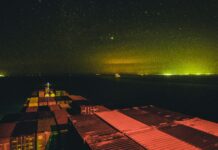
Wan Hai Lines is eschewing scrubbers in favour of low-sulphur fuel oil (LSFO) to comply with the International Maritime Organization’s 0.5% cap on sulphur content, the Taiwanese liner operator told Container News.
Wan Hai spokesperson Laura Su said: “We considered many factors (when making this decision). There are some arguments on the use of scrubbers and the regulations of several port states are also changing. So, we are aware of the higher price of low-sulphur fuel but still thought that using cleaner fuel would work better for us and the marine environment.”
Su said that shippers have accepted the higher surcharges as a result of the company’s decision.
On a per TEU basis, the surcharges are:
- US$16 to US$135 for intra-Asia services
- US$33 to US$260 for Asia-Indian Sub-Continent routes
- US$35 to US$280 for Asia-Middle East services
- US$24 to US$360 for Asia-Red Sea routes
- US$33 to US$491 for Asia-South America West Coast services
- US$335 for Asia-US West Coast services
- US$85 for US West Coast-Asia services
LSFO availability is not an issue as Wan Hai has contracts with bunker suppliers. Su added that so far, the company has not experienced any difficulties with procuring LSFO.
Wan Hai’s strategy distinguishes it from local peers, such as Evergreen Marine Corporation and Yang Ming Marine Transport Corporation, which have chosen to install scrubbers on their ships.
Of Evergreen’s 139 vessels, 53 have had a scrubber-fitted as of the end of 2019. By May 2020, Yang Ming plans to equip five container ships with scrubbers and another 29 ships later this year.
Evergreen and Yang Ming said last year that installing scrubbers would be more economical, as the price spread between high-sulphur and low-sulphur fuel was about US$250 per tonne then.
Unlike Evergreen and Yang Ming, Wan Hai is primarily an intra-Asia carrier, with 70% of its income derived from intra-Asia services.
Martina Li
Asia Correspondent




